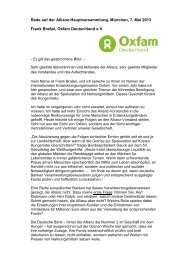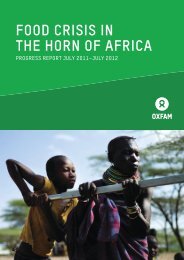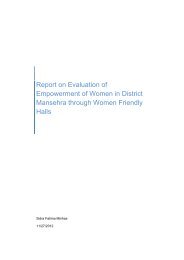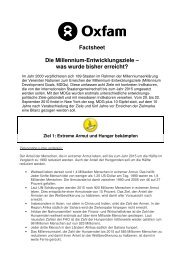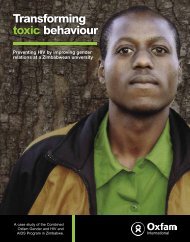No Time to Lose - Oxfam
No Time to Lose - Oxfam
No Time to Lose - Oxfam
You also want an ePaper? Increase the reach of your titles
YUMPU automatically turns print PDFs into web optimized ePapers that Google loves.
tion/prosecution, in practice this takes place at the commander’s discretion.<br />
111 Most cases adjudicated by military courts are traffic offenses,<br />
and the prosecution of senior officers is exceptionally rare. 112<br />
Under Afghan law, military courts have concurrent jurisdiction with<br />
civilian criminal courts over offences that violate both military and<br />
civilian criminal law 113 - meaning that if the military justice system<br />
fails <strong>to</strong> investigate/prosecute a case, the case can be pursued in the<br />
civilian criminal courts. But this concurrent jurisdiction is not recognised<br />
in practice. As described by one ISAF official, ‘the monster we<br />
created is a self-contained military justice system which the strongmen<br />
at the <strong>to</strong>p can turn on or off.’ 114<br />
The past couple of years have seen a number of positive developments.<br />
The latest version of the Military Criminal Procedure Code,<br />
passed last June, imposes a check on the power of the Corps Commander<br />
by empowering the Chief of the General Staff Legal Department<br />
(‘GS Legal’) <strong>to</strong> authorise investigations where the Corps Commander<br />
fails <strong>to</strong> do so. 115 Further, in a structural change recently approved<br />
by the Ministry of Defence, the ANA regional legal offices are<br />
<strong>to</strong> be removed from the Corps Commands and made directly accountable<br />
<strong>to</strong> GS Legal. And lastly, the new ANA Code of Structure<br />
and Authority for CID and Military Prosecu<strong>to</strong>rs (‘CID Law’) stipulates<br />
that commanders are responsible for referring cases <strong>to</strong> the CID and<br />
the prosecu<strong>to</strong>r for investigation/prosecution, that ‘no military authority<br />
is entitled <strong>to</strong> interfere or influence the duties and authorities of<br />
CID members and military prosecu<strong>to</strong>rs’, and that the CID and military<br />
prosecu<strong>to</strong>rs are directly responsible <strong>to</strong> GS Legal. 116 The legislation<br />
has been languishing in parliament since 2008, but once passed<br />
will be an important step <strong>to</strong>wards credible, independent investigation<br />
and prosecution. As stated by one ISAF official, ‘you can’t install rule<br />
of law if you don’t have honest, objective, independent investiga<strong>to</strong>rs<br />
who can’t be subjected <strong>to</strong> commander influence’. 117<br />
Minimising ‘Collateral Damage’<br />
Finally, some significant steps have been taken by international military<br />
forces <strong>to</strong> minimise civilian harm caused during the course of military<br />
operations, and <strong>to</strong> improve the international response <strong>to</strong> civilian<br />
casualty incidents. Recent ISAF initiatives include tactical directives<br />
restricting ‘close air support’ for ground troops in populated areas;<br />
tactical directives regarding the conduct of night raids (including the<br />
requirement that compensation claim forms and contact details be left<br />
at the site); the issuance of standard operating procedures on the escalation<br />
of force and the investigation of civilian casualties; ‘non-binding<br />
guidelines’ on ex-gratia payments and in-kind assistance following<br />
civilian casualty incidents or damage <strong>to</strong> civilian property; and the<br />
creation of a civilian casualty tracking cell. 118 While far from perfect,<br />
25






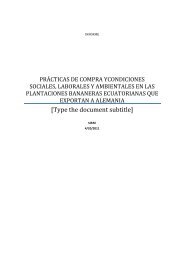
![Download: Faltposter EU-Handelspolitik [PDF 2,17MB] - Germanwatch](https://img.yumpu.com/25095854/1/190x161/download-faltposter-eu-handelspolitik-pdf-217mb-germanwatch.jpg?quality=85)
